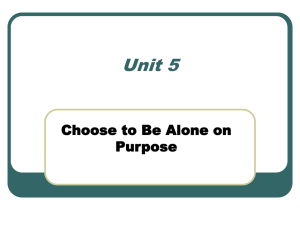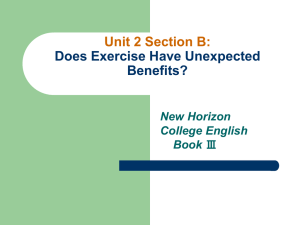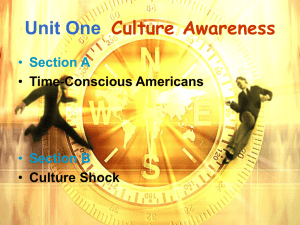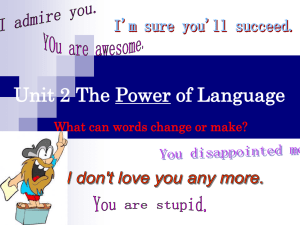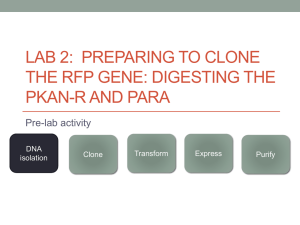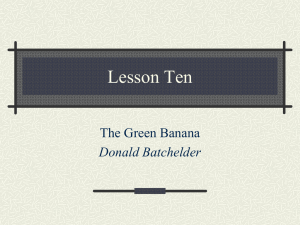Individual Task 1 Robert Fisk article In class we did the following
advertisement
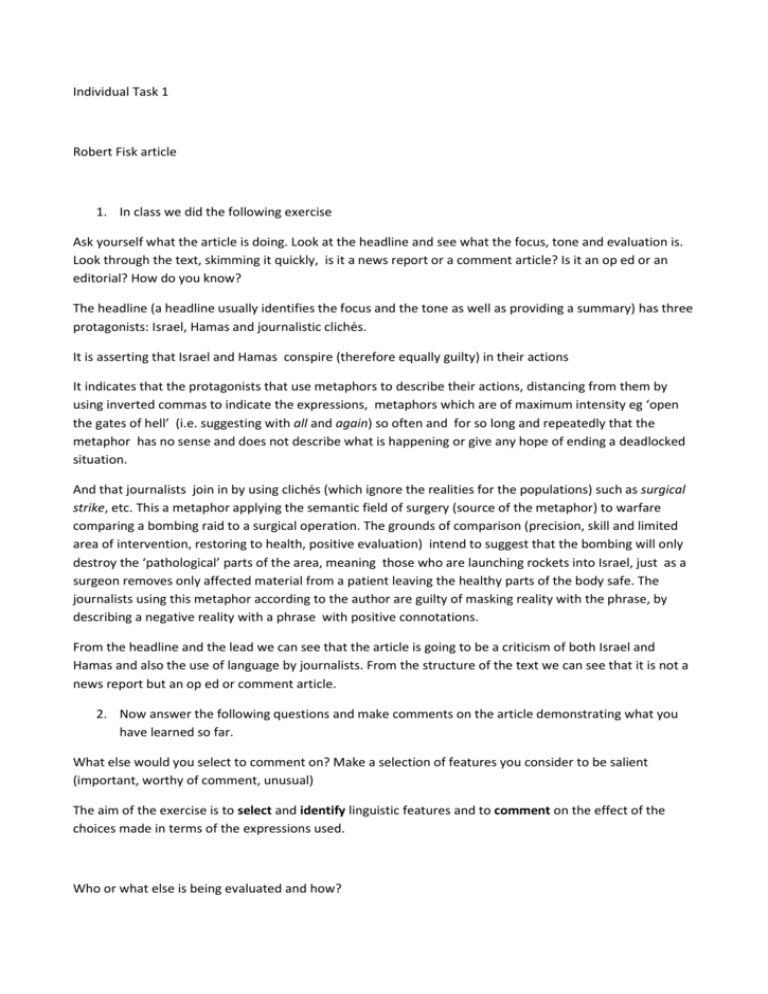
Individual Task 1 Robert Fisk article 1. In class we did the following exercise Ask yourself what the article is doing. Look at the headline and see what the focus, tone and evaluation is. Look through the text, skimming it quickly, is it a news report or a comment article? Is it an op ed or an editorial? How do you know? The headline (a headline usually identifies the focus and the tone as well as providing a summary) has three protagonists: Israel, Hamas and journalistic clichés. It is asserting that Israel and Hamas conspire (therefore equally guilty) in their actions It indicates that the protagonists that use metaphors to describe their actions, distancing from them by using inverted commas to indicate the expressions, metaphors which are of maximum intensity eg ‘open the gates of hell’ (i.e. suggesting with all and again) so often and for so long and repeatedly that the metaphor has no sense and does not describe what is happening or give any hope of ending a deadlocked situation. And that journalists join in by using clichés (which ignore the realities for the populations) such as surgical strike, etc. This a metaphor applying the semantic field of surgery (source of the metaphor) to warfare comparing a bombing raid to a surgical operation. The grounds of comparison (precision, skill and limited area of intervention, restoring to health, positive evaluation) intend to suggest that the bombing will only destroy the ‘pathological’ parts of the area, meaning those who are launching rockets into Israel, just as a surgeon removes only affected material from a patient leaving the healthy parts of the body safe. The journalists using this metaphor according to the author are guilty of masking reality with the phrase, by describing a negative reality with a phrase with positive connotations. From the headline and the lead we can see that the article is going to be a criticism of both Israel and Hamas and also the use of language by journalists. From the structure of the text we can see that it is not a news report but an op ed or comment article. 2. Now answer the following questions and make comments on the article demonstrating what you have learned so far. What else would you select to comment on? Make a selection of features you consider to be salient (important, worthy of comment, unusual) The aim of the exercise is to select and identify linguistic features and to comment on the effect of the choices made in terms of the expressions used. Who or what else is being evaluated and how? For example in terms of attribution: Who or what is being evaluated in reporting expressions such as the following (they are reporting verbs mostly from non-core vocabulary and are synonyms for said, talked about and other verbs of speech? What other evaluative meanings have been added by using these verbs? Claiming to do unsuccessfully for 64 years Waffled on about Conned Writing like performing bears Repeating all the clichés we’ve used for the past 40 years Claims a spurious neutrality We are myth making Trumpets its fears What do the time references add? Why are there so many time expressions in the article? (e.g. again, for 64 years, for the past 40 years, in 1982, 2008-9, routinely, yet again,) what is the effect in terms of evaluation, what meaning accumulates from this list of time expressions? What other evaluations are being made? : Happily negociated in the 80s Don’t say that. Delete the last two sentences Look at what is said about the use of language. Why are certain expressions in quotation marks? What does this mean? (e.g. opened the gates of hell, root out Palestinian terror, gates of hell, Palestine’s in para 1; targeted attack, surgical air strike, surgical air strikes, surgical in para 2; rooting out terror in para 4; no1 shadowy leader in para 5; principally responsible in para 7) What is the effect of the use of quotation marks? Evaluation, focus, force and lexical cohesoin Who or what is being evaluated by the following expressions, what can you say about the expressions used in terms of force or focus, intensity, metaphorical meaning?: Murdering para 1 , murder para 2, murderous para 3 What is the difference between murder and kill? We journos para 2 Why journos why not journalists? Bunch of mobsters para 3 Stunning success para 4 Only good guys and bad guys para 9 Pillar of Defence, Pillar of hypocrisy para 14 This nonsense this garbage war para 8 This outrageous conflict para 9 Human dross ripped apart Poor old King Abdullah para 12 America’s clowning para 12 Pitiful William Hague para 7 Godzilla rockets para 2 Exchange rate para 3 Kicked off the whole shooting match para 7 Stolen para 8 Anti-Semitic Nazi para 3 Evil, wicked, unspeakable, devilish and murderous para 3 Use colours to identify items and use the comments function or footnotes to make any relevant comments about the linguistic choices.



